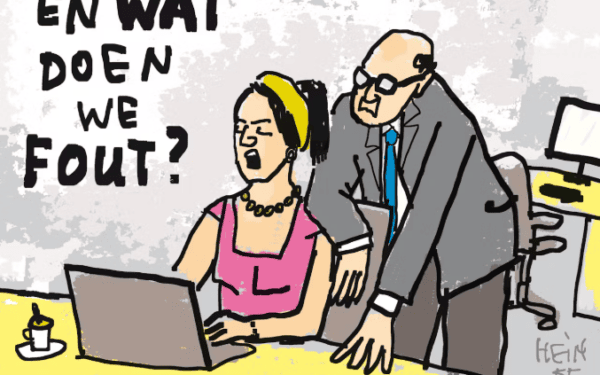
Dit is update nummer 7 van onze lopende Q&A over Corona. Hieronder volgt informatie over het door het UWV gepubliceerde addendum bij de Wet Verbetering Poortwachter i.v.m. het coronavirus, de rekentool voor de hoogte van de subsidie o.b.v. de NOW-regeling en recente wijzigingen in de NOW-regeling.
Addendum bij Wet Verbetering Poortwachter
De coronacrisis kan invloed hebben op het re-integratietraject van zieke werknemers. Het UWV heeft een addendum gepubliceerd behorende bij de Wet Verbetering Poortwachter waarin wordt verduidelijkt hoe het UWV omgaat met de gevolgen van het coronavirus waarbij maatwerk zal worden verricht bij het toetsen van de re-integratieverplichtingen. Het addendum is via de volgende link te raadplegen: https://www.uwv.nl/werkgevers/overige-onderwerpen/addendum-werkwijzer-poortwachter/index.aspx
Hieronder volgen in het kort de belangrijkste punten van het addendum:
- Maatwerk
Uitgangspunt van de beoordeling is nog steeds de Werkwijzer Poortwachter. Als de beoordeling van het re-integratieverslag leidt tot de conclusie dat er onvoldoende re-integratie-inspanningen worden geleverd, wordt wel rekening gehouden met hoe de situatie in het bedrijf van de werkgever als gevolg van het coronavirus van invloed is (geweest) op het re-integratieproces of het herstel hiervan.
- Beoordelen RIV
Indien een werkgever zonder deugdelijke grond zijn re-integratieverplichtingen onvoldoende is nagekomen, kan het UWV een loonsanctie opleggen (het verlengen van de loondoorbetalingsplicht met maximaal 52 weken). In het kader van het coronavirus zal maatwerk worden verricht bij het toetsen van de re-integratieverlichtingen. De werkgever dient te motiveren wat de gevolgen van het coronavirus zijn voor zijn organisatie en het re-integratietraject van de zieke werknemer. Het UWV beoordeelt vervolgens of zij deze redenen voldoende plausibel vinden voor het stagneren van de re-integratie-inspanningen.
-
- Uitgangspunt is dat de beoordeling van het RIV binnen de grenzen van de redelijkheid plaats vindt. Vastgesteld moet worden of er gezien de bijzondere omstandigheden in alle redelijkheid voldoende aan re-integratie is gedaan en/of de verwachte procesgang wel/niet gevolgd kon worden. Hetzelfde geldt ook voor het RIV-EDV en het RIV ERD-ZW.
- Fysieke handtekeningen op documenten zijn niet nodig. De werknemer kan in de daarvoor bestemde documenten (of in RIV of op de aanvraag) zijn visie op de re-integratie verwoorden.
- Het RIV wordt zoveel mogelijk beoordeeld op basis van de gegevens van de bedrijfsarts. De arbeidsdeskundige overlegt nog steeds met de verzekeringsarts in de hiervoor aangewezen situaties, de verzekeringsarts neemt zo nodig contact op met de bedrijfsarts maar als de gegevens van de bedrijfsarts ook maar enigszins plausibel zijn, wordt dit als uitgangspunt genomen voor de RIV-toets.
- Dreigende betalingsonmacht is nu en door het coronavirus geen reden om van een loondoorbetalingsverplichting af te zien. Het feit dat een werkgever niet aan zijn betalingsverplichtingen kan voldoen, kan niet betekenen dat de re-integratie-inspanningen dan als ‘voldoende’ moeten worden beschouwd. Het kan evenmin gelden als een ‘deugdelijke grond’ voor die ‘onvoldoende inspanningen’. Daarnaast compenseert de overheid tot maximaal 90% van de loonkosten o.g.v. de NOW-regeling. Voor de bekostiging van arbeidsdeskundig onderzoek en dergelijke door de werkgever, voorziet de overheid door o.a. garanties te geven voor bedrijfskredieten.
- Ook na afloop van de coronacrisis zal UWV rekening houden met situaties waarbij het coronavirus de re-integratie-activiteiten beïnvloedde.
- Deskundigenoordelen
Deskundigenoordelen worden door het UWV zoveel mogelijk op stukken en op afstand uitgevoerd, waarvoor creatieve oplossingen kunnen worden gezocht. Het zal echter niet in alle gevallen mogelijk zijn om tot een inhoudelijk oordeel te komen, bijvoorbeeld in verband met noodzakelijk fysiek spreekuur bij een verzekeringsarts. Als dit aan de orde is, kan de werkgever bij latere RIV-beoordelingen niet worden verweten dat er bij impasse of stagnerende re-integratie geen deskundigenoordeel is aangevraagd, gedurende de coronaperiode.
Rekentool voor berekenen hoogte subsidie
Inmiddels is door de Universiteit van Amsterdam een rekentool ontwikkeld waarmee de hoogte van de subsidie op basis van de NOW-regeling kan worden berekend. De hoogte van het voorschot kan hiermee worden berekend, maar ook de definitieve hoogte van de subsidie. De rekentool is gebaseerd op de NOW-regeling per 3 april 2020 en is te vinden op: https://www.magontslag.nl/c/Contents/Item/Display/210.
Wijzigingen in de NOW-regeling
De NOW regeling is vers van de pers, maar de eerste wijzigingen zijn inmiddels doorgevoerd. De wijzigingen in het kort:
- Strengere toets UWV bij ontslagaanvraag BE redenen
Het UWV gaat bij de beoordeling van ontslagaanvragen wegens bedrijfseconomische redenen de NOW-regeling meewegen. Dit betekent dat de werkgever aannemelijk moet maken dat het ontslag niet kan worden voorkomen door een beroep op de NOW-regeling. Deze toets geldt alleen voor ontslagaanvragen die zijn ingediend na 2 april 2020, omdat de invulling van de NOW-regeling toen pas bekend was. - Artikel 7 NOW-regeling: berekening hoogte subsidie bij ontslagaanvraag wegens BE redenen
De berekening van de ‘boete’ (50% van het loon) voor de werkgever die toch een ontslagvergunning aanvraagt tijdens de subsidieperiode is aangepast, omdat dit niet in alle gevallen tot het gewenste effect leidde. Als voor een werknemer een ontslagaanvraag wordt ingediend wegens bedrijfseconomische redenen, dan is de subsidieverlaging 50% hoger dan wanneer van diezelfde werknemer over de periode maart tot en met mei 2020 (d.w.z. de compensatieperiode) het loon niet was doorbetaald. In de toelichting bij de gewijzigde regeling staat een rekenvoorbeeld die dit verder verduidelijkt: https://www.rijksoverheid.nl/binaries/rijksoverheid/documenten/regelingen/2020/04/03/wijziging-now/2+april+wijzigingsregeling.pdf. - Artikel 14 lid 4 NOW-regeling: aanpassing vaststellingstermijn definitieve subsidie
Deze termijn is verruimd van 22 naar 52 weken, zodat het UWV voldoende tijd heeft om een goede controle te verrichten naar de verzoeken om (definitieve) vaststelling van de subsidie en de daarbij aangeleverde gegevens. De vaststelling zal in die gevallen zoveel als mogelijk wel in de eerste 22 weken plaatsvinden. In een aantal gevallen zullen aanvullende controlewerkzaamheden nodig zijn, waarvoor de verruimde termijn dan voldoende ruimt biedt. - Artikel 8 lid 8 NOW-regeling: aanvulling subsidieaanvraag bij buitenlands rekeningnummer
Het UWV kan geen subsidieaanvragen behandelen waarin een buitenlands bankrekeningnummer is opgegeven. Uit artikel 8 lid 8 NOW-regeling nieuw volgt dat werkgevers met een buitenlands rekeningnummer binnen vier weken na de aanvraag een Nederlands rekeningnummer kunnen doorgeven. De subsidie zal vervolgens betaald worden op dit Nederlandse rekeningnummer.
Aarzel niet om contact met ons op te nemen indien u nadere vragen heeft.
Arlette Putker – Blees & Irene Francken – van der Ven
Arlette.Putker@LenAadvocaten.nl
tel: +31 (0)20 7608811
mob: +31 (6)13 14 48 50+31 (0)6 13 14 48 50
Irene.Francken@LenAadvocaten.nl
tel: + 31 (0)20 7608814 (direct)
mob: + 31 (0)6 3100011
Addendum to the Gatekeeper Improvement Act (Wet Verbetering Poortwachter), NOW Calculator and NOW amendments
This is update number 7 of our ongoing Q&A about Corona. Please find below some information about the addendum published by the UWV to the Gatekeeper Improvement Act (Wet Verbetering Poortwachter) in connection with corona virus, the tool for calculating the amount of the allowance based on the NOW scheme and recent changes to the NOW scheme. NOW is the abbreviation in Dutch for the Emergency Bridging Measure for the Preservation of Jobs.
Addendum Gatekeeper Improvement Act (Wet Verbetering Poortwachter)
The corona crisis may have an impact on the reintegration pathway for sick employees. The UWV has published an addendum to the Gatekeeper Improvement Act (Wet Verbetering Poortwachter), clarifying the way in which the UWV is dealing with the impact of the corona virus. In the current situation, reintegration reports are being assessed on a case-by-case basis. The addendum can be consulted at: https://www.uwv.nl/werkgevers/overige-onderwerpen/addendum-werkwijzer-poortwachter/index.aspx
Below is a summary of the main points in the addendum:
1.Assessments on a case-by-case basis
The starting point for assessment is still the Werkwijzer Poortwachter, i.e. the guidance on integrating sick or incapacitated workers. If the assessment based on the reintegration report leads to the conclusion that not enough effort has been put into reintegration, then consideration is given to the extent to which a reintegration process – or renewed reintegration process – has been affected by the situation that the employer’s business finds itself in due to the corona virus.
2.Assessment of the re-integration report
Employers who, without good reason, have failed to sufficiently comply with their re-integration obligations, can be fined by the UWV; this fine takes the form of extending the obligation to continue paying wages up to a maximum of 52 weeks. In the context of the corona virus, employers’ compliance with their reintegration obligations will be tested on a case-by-case basis. Employers must describe, with supporting evidence, what the impact of the corona virus is having on their business and the reintegration pathway of the sick employee. The UWV will then assesses whether the reasons given for ceasing the reintegration efforts are sufficiently credible.
- The starting point is that the reintegration report must be assessed within the framework of what could be reasonably expected. The test is whether the reintegration efforts were reasonably sufficient and/or whether it was possible to follow the expected pathway, under the special circumstances. The same likewise applies to the reintegration report for workers whose contract has come to an end during a period of sickness and the reintegration report where the employer has opted to be the risk-bearer under the Dutch Sickness Benefits Act (Ziektewet).
- Physical signatures on documents are not necessary. Employees may articulate their views on reintegration in the designated documents (either in the reintegration report or on the application form).
- The reintegration report should be assessed as much as possible on the basis of information provided by the company doctor. The occupational health & safety expert is in ongoing consultation with the insurance doctor in the appropriate situations and the insurance doctor contacts the company doctor, if necessary; however, if the information provided by the company doctor is plausible, this is taken as the starting point for assessing the reintegration report.
- Imminent insolvency is not a reason, not even due to the corona virus, to fail to comply with an obligation to continue paying wages. The fact that an employer is unable to meet its payment obligation does not mean that the reintegration efforts must be deemed as ‘sufficient’. Neither can this be deemed as a ‘plausible reason’ for efforts that are ‘insufficient’. Additionally, under the government’s NOW scheme, there is compensation for up to 90% of labour costs. One of the ways in which the government is helping with the costs of an occupational health & safety expert, etc. is by providing guarantees for business loans.
- Even after the corona crisis has run its course, the UWV will still take into account situations where the corona virus affected reintegration activities.
3.Professional assessments
Professional assessments will be commissioned by the UWV as far as possible on the papers and remotely. This will require a creative approach. However, it will not be possible in all cases to arrive at a substantive opinion; for example, the compulsory face-to-face appointment with an insurance doctor will not be possible. If relevant in the case of subsequent reintegration report assessments, it will not be possible to accuse the employer that a professional opinion was not requested during the corona period because of an impasse or cessation of reintegration efforts.
Calculator for calculating the amout of financial suppert
In the meantime, the University of Amsterdam has developed a calculator to calculate the amount of financial support under the NOW scheme. This handy tool can be used to calculate the advance payment as well as the final amount of financial support. The calculation is based on the NOW scheme dated 3 April 2020 and can be found at https://www.magontslag.nl/c/Contents/ltem/Display/210.
Changes to the NOW scheme
Even though the NOW scheme was introduced recently, initial changes have already been made. In brief, the changes are as follows:
1.Stricter UWV test for dismissal applications for economic reasons
When assessing dismissal applications for economic reasons, the UWV will also take into account the NOW scheme. This means that the employer must plausibly argue that dismissal cannot be prevented by recourse to the NOW scheme. This test applies only to dismissal applications submitted after 2 April 2020, because this was the date when application of the NOW scheme became known.
2.Article 7 NOW scheme: calculating the amount of financial support in the case of applications for dismissal for economic reasons
Where employers nevertheless make an application for dismissal during the period when financial support is granted, the amount of the ‘fine’ (50% of pay) has been changed, because this has not delivered the desired result in all cases. Where an application is made to dismiss an employee for economic reasons, the following applies: the reduction in financial support is 50% higher than if there had been no continued payment of wages for the same employee in the period March to May 2020 (i.e the compensation period). The explanatory notes to the amended scheme give an example calculation that clarifies this further: : https://www.rijksoverheid.nl/binaries/rijksoverheid/documenten/regelingen/2020/04/03/wijziging-now/2+april+wijzigingsregeling.pdf
Article 14(4) NOW scheme: extension to the period for calculating the final amount of financial support This period has been extended from 22 to 52 weeks, so that the UWV has sufficient time to properly check applications submitted for an interim or final calculation of the financial support and to verify the information supplied with these applications. In those cases, calculations will as far as possible be carried out in the first 22 weeks. The extended deadline allows more than enough time for additional verifications that are required in a number of cases.
3.Article 8(8) NOW scheme: new rule on applications for financial support where a non-Dutch bank account number is provided
The UWV cannot deal with any applications for financial support that provide a foreign bank account number. Article 8(8) of the NOW scheme now states that employers with a non-Dutch bank account can provide a Dutch bank account number within four weeks of the application. The financial support will then be paid into this Dutch bank account.
Please do not hesitate to contact us if you have any further questions.
Arlette Putker-Blees & Irene Francken-van der Ven
Arlette.Putker@LenAadvocaten.nl
Tel.: +31 (0)20 7608811
Mobile: +31 (6)13 14 48 50
Irene.Francken@LenAadvocaten.nl
Tel.: + 31 (0)20 7608814
Mobile: + 31 (0)6 31000115



